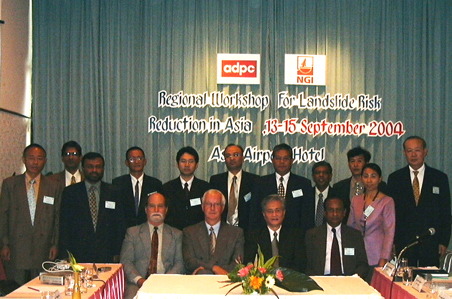|
|
 |
Asian Program for Regional Capacity Enhancement for Landslide
Impact Mitigation (RECLAIM)
 In collaboration with the Norwegian Geotechnical Institute (NGI),
ADPC started a three year program for Regional Capacity Enhancement for
Landslide Impact Mitigation (RECLAIM) in July 2004. With core funding
from the Royal Norwegian Ministry of Foreign Affairs, the long term
objective of the program is to reduce the landslide disaster
vulnerability of human settlements, infrastructure and critical
facilities in Bhutan, India, Indonesia, Nepal, Sri Lanka, and Thailand. In collaboration with the Norwegian Geotechnical Institute (NGI),
ADPC started a three year program for Regional Capacity Enhancement for
Landslide Impact Mitigation (RECLAIM) in July 2004. With core funding
from the Royal Norwegian Ministry of Foreign Affairs, the long term
objective of the program is to reduce the landslide disaster
vulnerability of human settlements, infrastructure and critical
facilities in Bhutan, India, Indonesia, Nepal, Sri Lanka, and Thailand.
Asian countries have seen increased incidents of landslides, other
mass movements and flash flooding causing considerable economic and
human losses. Increased vulnerability is attributed to the growing
anthropogenic activity in hilly areas and mountain slopes. However, few
efforts have been made by stakeholder institutions to address the social
and technical dimensions and to develop cost effective landslide
mitigation solutions. The information needs required to implement these
initiatives have not yet been fully taken up yet by professionals in
developing countries. Because traditional ways of providing training to
key stakeholder institutions, landslide mitigation professionals, the
service sector and decision-makers is not effective, the project focuses
on exchange of knowledge, face-to-face contact, discussion about
capacity building, and knowledge management as measures for effective
landslide mitigation.
The program started with a regional workshop for Landslide Risk
Reduction in Asia from 13 - 15 September 2004 in Bangkok.
The program is being implemented under ADPC's Urban Disaster Risk
Management (UDRM) Team. For more information on the program contact
arambepola@adpc.net and
rajesh@adpc.net or visit the world
wide web at
http://www.adpc.net/udrm/reclaim/introduction.html
Land Use Planning for
Disaster Risk Management
Two courses on Land Use Planning for Disaster Risk Management were held
from 8 -12 November in Lao PDR and 13 - 17 December 2004 in Sri Lanka
under ADPC's Urban Disaster Risk Management (UDRM) Team. The course was
designed to merge experiences from two professional fields of practice:
Land Use Planning and Risk Management, aiming at developing a framework
to integrate a set of generic and hazard-specific risk management
principles into the planning and management of land use.
The course was aimed at land use planners, urban planners, municipal
engineers and other professionals, administrative and elected officers
to urban, municipal, and local governments. The aim was to facilitate
discussion about the ways cities and local governments can minimize
risks in developing long-range land use policy strategies, and in
carrying out day-to-day development review responsibilities. The course
was delivered jointly by the Asian Disaster Preparedness Center and the
GIS Application Center (GAC), Asian Institute of Technology, Thailand.
Fourth Regional Training
Course on Earthquake Vulnerability Reduction for Cities (EVRC-4)
The fourth Earthquake Vulnerability Reduction Course was held in
Jakarta, Indonesia from 29 November to 4 December 2004. The course was
targeted at those concerned with the reduction of vulnerability to
earthquakes in urban areas. It aimed at enlightening the participants
about the causes and effects of earthquakes as well as the possible
strategies and approaches to reducing the damage and loss of life caused
by these destructive events.
The course was organized by the ADPC in collaboration with the World
Seismic Safety Initiative (WSSI), Earthquake and Megacities Initiative
(EMI), and Yayasan Inovasi Pemerintahan Daerah/Center for Local
Government Innovation (YIPD/CLGI) Jakarta. It builds on past and ongoing
endeavors such as EMI, UN, IDNDR, ISDR initiative for Risk Assessment
Tools for Diagnosis, Urban Areas against Seismic Disasters (RADIUS), and
Global Earthquake Safety Initiative (GESI) launched by UNCRD and
Geo-Hazard International. The previous courses were conducted in Nepal
and Bangladesh. The course offers an overview of urbanization, urban
hazards, vulnerabilities, risk and disaster management, earthquake
hazard and risk assessment methods, and plan implementation for
vulnerability reduction.
The above course was conducted under ADPC's Urban Disaster Risk
Management (UDRM) Team. For more information on training activities,
contact Mr N.M.S.I Arambepola, Team Leader at
arambepola@adpc.net
|

